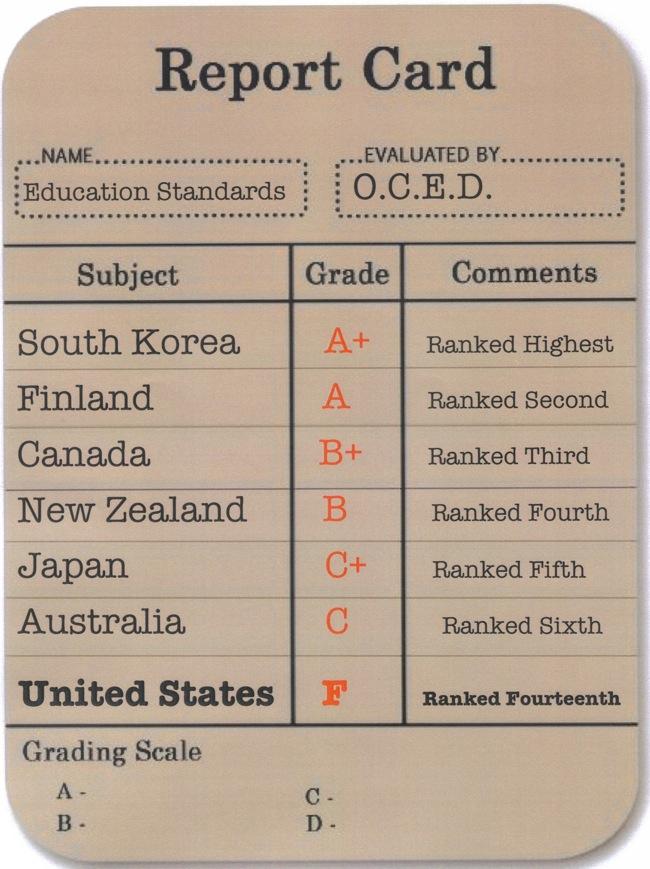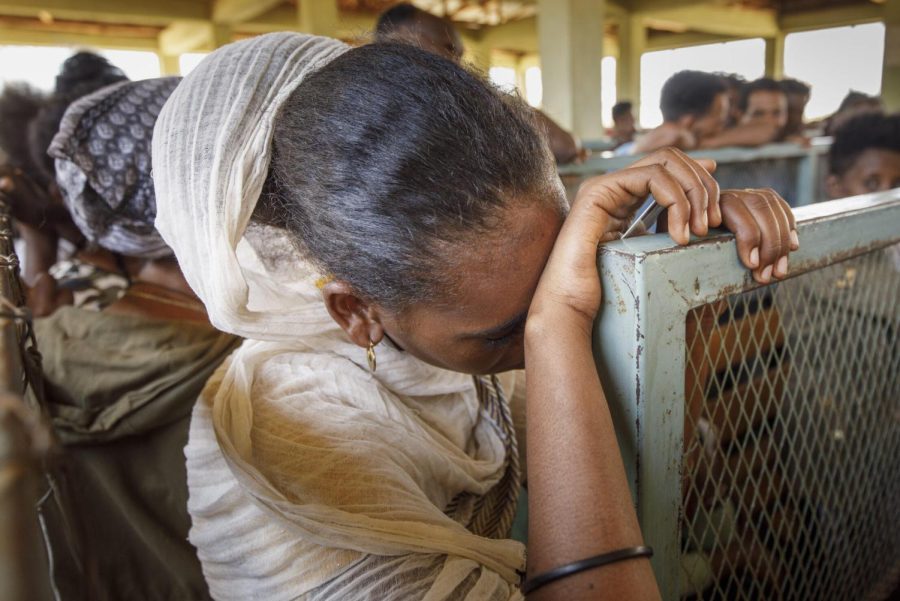 The U.S. is the most educated country in the entire world, right? Wrong. In a recent study by the Organization for Economic Co-Operation Development (OCED), about 470,000 15-year-olds from all over the world were tested in math, science and literacy. The results of this study exposed surprising information about the strength of school systems all over the world.
The U.S. is the most educated country in the entire world, right? Wrong. In a recent study by the Organization for Economic Co-Operation Development (OCED), about 470,000 15-year-olds from all over the world were tested in math, science and literacy. The results of this study exposed surprising information about the strength of school systems all over the world.
Placing first in reading was South Korea followed by Finland, Canada, New Zealand and Japan. In math, first place was filled by South Korea and was followed by Finland, Switzerland, Japan and Canada. Lastly, in science Finland placed first and was followed by Japan, South Korea, New Zealand and Canada. In the past, the U.S. has placed much higher than 14th place in the reading category and an even lower ranking of 25th place in math. This low ranking number shows how imperative it is that the United States strengthens its education systems in order to keep up with its competition.
“[America is ranked low] because Americans have become to lazy to think” Sophmore James Barker said.
Why are other countries all of a sudden so keen on their strengthening their educational systems? The truth is they actually aren’t testing higher than in years past. The recent simplification of nationwide curriculum has strongly affected the IQs of American students causing a high increase in uneducated adults. More and more students are finding it harder to get good jobs with a standard American education. Research shows by the OCED shows that this decline in the quality of education in the U.S. is caused by a domino effect with many branches. These branches include those of an increase in high school dropouts and a decrease in graduates with government jobs. Other countries have attempted, and accomplished, to keep the basics of their curriculum the same due to the incessant rewarding results for their school system.
Even though America does have many educational downfalls, as a country the U.S does also use some techniques from across the globe already, such as memorization through tools like flashcards and vocabulary sheets like many students n South Korea and Japan, helping students remember the most important topics. However, there are still a lot of techniques that the US hasn’t used yet, and some say they may be the key to creating a stronger education system for years to come.
“[ I believe the problem is that] other countries have education systems that better fit their country,” Sophmore Megan Ryan said.
There are many reasons that the US didn’t place first in all three of the OCED’s categories. One of the major reasons for all of the other countries’ success comes from their educating techniques. In many Asian countries such as South Korea, children are introduced to subjects like basic geometry and algebra at a much younger age than in the U.S., giving them a leg up as they get older. Another well-known technique by foreign school systems, like France for instance, is the long school days. Although summer comes much earlier for these students, this tactic also allows teachers time to teach in- depth information about the subject the students are learning. Finally, there are many school systems all over the world that focus solely on the basics of learning in each subject. By doing so, the students in these schools become almost perfect at each subject and are less concerned with the least important topics that many American teachers are obligated to teach. When these American teachers are given large amounts issues to cover in only a years’ time, the students are given a shorter period in which they can remember all of this information. Nonetheless, America is not sitting back and watching this education system fail; many groups are attempting to increase education with plans to enhance our future kids’ education.
“[We need to fix our education system in order to keep balance throughout the country,” Ryan said.
The College Board Advocacy and Policy Center is hoping to lessen this education gap with their “55% by 2025” plan. This plan is hoping to increase the number of people between ages 25 and 34 who have their Associates Degree by the year 2025. In order to complete this task, the board has created a list of ten ways to increase the number of educated people, starting with children. First, the group wants to make pre-school programs more affordable for low income families, allowing children the access to immediate learning, which is intended to give them a brighter future. Second, they want to improve middle and high school counseling programs in order to give kids a better look at their future. Third, the OCED will use appropriate research in order to create effective drop-out prevention programs, which will help more students to complete school. Fourth, the board wants all public schools to align to the standards of international school systems like South Korea’s, which is top in two of the major categories. This will allow students to “learn from the best” and hopefully increase the extent of a child’s education. Fifth, the organization wants to improve teacher quality, which is followed by clarifying college admission processes as the sixth idea. The last four planning ideas include keeping college affordable and creating strong adult education programs, giving men and women who have already graduated a chance to refresh their education and even learn something new.
“If the governenment works hard enough, creating a stronger American education making our country stronger all around,” Sophmore Lillian Montes De Oca said.
Although all school systems enlighten students on new information every day, these major studies are revealing information that tell people as a society about what students actually learn. Some believe that if the government starts focusing on education, the chance of the United States, once again, being in the top ten most educated countries will greatly increase.
Written by Destiny Gammon, International Editor







